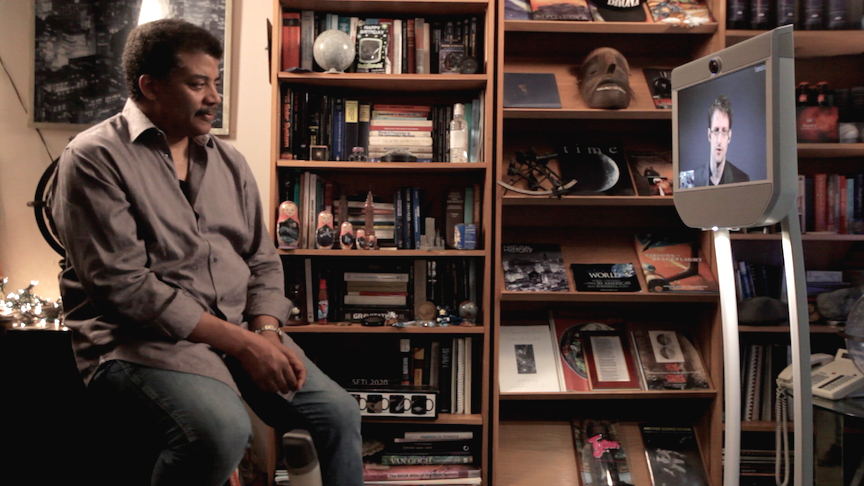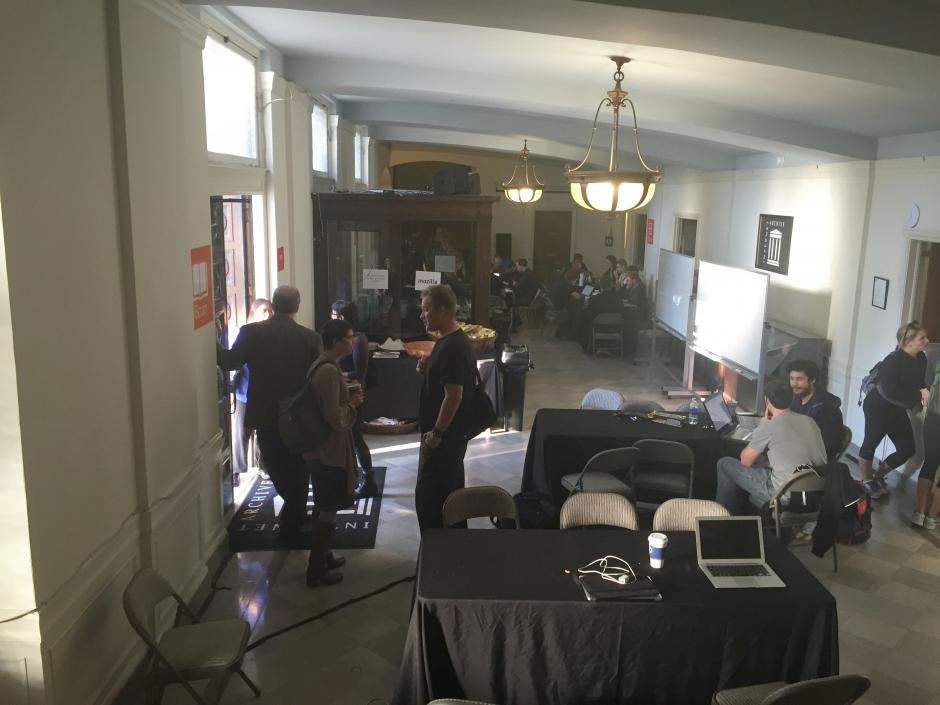See Cindy Cohn at this year’s Evening Event: TICKETS HERE
(Discount code: “hackathoner” for 1/2 price :-)
Download mp4 Hi-res files of entire event

Note: I’m including a full transcription at the bottom of this post. (Thanks to OpenTranscripts.org for their transcriptions of these talks.)
Quotes from Cindy’s Talk:
The Internet is going to be the means by which we do all the rest of the change that we need to do so badly in this world. And that I think there’s enough people now that we really have a movement, and we need to start thinking of ourselves as a movement, and we have to figure out what our next steps are…
Sitting here and listening to all the presentations tonight, seeing the amazing activity out there, seeing the tentacles of what Aaron was a part of in the early days, and in some ways the heart of, in the early days, become a movement. You guys, you’re a movement and thank you so much for doing this. So let’s figure out what our next fights are together and our work is together…
I think if people who want to honor Aaron Swartz do one thing with regard to Congress and then go back to coding, the one thing you should do is say “That law goes no further. It doesn’t get any worse and it doesn’t take any lives.”…
There is some good news in the state of California. We just passed, and we got Governor Brown to sign, a law called CalECPA, which requires the cops, the California state cops, to get a warrant before they go after your information stored with service providers…
It’s time for the legislature and the FBI to get over it. Crypto is here to stay, and all of the tools that we’ve talked about here tonight depend on the ability for people to have strong unbreakable crypto, and we need to stand up for it again. Watch the EFF web site. We’re going to keep talking about this, and you’ll see some causes…
I think we need to send a strong message to the White House that President Obama needs to come out and take a strong stand on crypto, not just say “we’re not going to come after crypto right now, but we may do something later” but to say, “No. Hell no. Americans deserve to have locks on their doors that don’t have backdoor entries for law enforcement.”…
And while the folks in Washington DC like to just wave their hands and say, “You geeks sort it out. Find a way to have a backdoor that only good guys can go in and bad guys can’t,” those of us who know about technology, and more importantly those of us who know about math, know that this is impossible…
I’m so happy to see so many projects being celebrated here that were created or inspired or legally defended by EFF. We’re going to continue to be the support for this community. One of the things that John Perry Barlow taught me years ago is that your rights aren’t given to you, your rights have to be taken. And we’re here today to continue to take our rights.
*** Complete Transcription Below***
Thanks so much for inviting me. When I took over as Executive Director of the EFF in April [2015], many people asked me, “Well, what do you want to do? How do you want to be different than your predecessor, the amazing Shari Steele” who has her own little statue. She’s the only non-Archive person who has a statue in the Archive, and Brewster did that to honor her and the work that we’ve done together.
What I said was, you know I think that there are enough people who care about the Internet, who understand, as my friend Cory Doctorow said, that whatever other issue draws you, if the Internet isn’t free this is the place. The Internet is going to be the means by which we do all the rest of the change that we need to do so badly in this world. And that I think there’s enough people now that we really have a movement, and we need to start thinking of ourselves as a movement, and we have to figure out what our next steps are.
And I have to say, sitting here and listening to all the presentations tonight, seeing the amazing activity out there, seeing the tentacles of what Aaron was a part of in the early days, and in some ways the heart of, in the early days, become a movement. You guys, you’re a movement and thank you so much for doing this. So let’s figure out what our next fights are together and our work is together. But, this has just been very exciting to see, and to see the growth. And, ya know, we lost our dear friend as a result of some really horrible laws and some really horrible policies, but seeing the green shoots that’ve grown as a result of this just does my heart good.
Lisa wanted me to talk a little about CISA, the cybersecurity act. I think that at this point the best thing that this community can do about CISA is first of all continue to talk about how rotten it is, because it’s a really rotten idea. We have a terrible cybersecurity problem. This is the a cybersecurity act that was recently passed out of the Senate.
We have a terrible problem with security on the Internet, as Brewster pointed out, and Congress just passed a bill that doesn’t make anything better and makes several things significantly worse, in the fine tradition of our Congress.
I don’t know that there’s too much we can do in terms of public activism on the bill right now, realistically, because it’s in a conference committee time, which isn’t the time when there are very many members of Congress who are going to pay attention to it. There’s one thing, though, that we have to keep watching on and that you’ll hear EFF and others rally the troops on, and that is the effort to try to put some horrible changes to the Computer Fraud and Abuse Act into this bill. We expect it’s going to come up again, and when it does you’ll hear the rallying cry. And I think if people who want to honor Aaron Swartz do one thing with regard to Congress and then go back to coding, the one thing you should do is say “That law goes no further. It doesn’t get any worse and it doesn’t take any lives.”
We have a couple other policy opportunities that I thought I’d mention to you guys. We just got a really amazing ruling out of the European Court of Justice in the last couple weeks that really points out what a global problem the NSA’s overreach and the surveillance overreach is. It’s got some complicated stuff having to do with the safe harbors and how American companies get to process information related to people all around the world. But the important part for us is to keep a close eye on what happens next, because the old rules have been crossed out and the American companies and the European regulators and the American government are in an intense negotiation about what happens next.
So we’ve got an inflection point opportunity here and we ought to be talking about this European Court of Justice opinion and what it means, because what the European Court of Justice said is the NSA surveillance is not appropriate. For the legal geeks, this is surveillance under Section 702 of the FISA Act and Executive Order 12333. What that means is the American government’s view that it can spy on the rest of the world with impunity, that it can do mass spying of people around the world who are not suspected of any crimes, who aren’t targets, who aren’t foreign spies, is unacceptable under European law. It’s a really excellent decision. You guys should all thank Max Schrems, who brought that case.
And there’s a moment now, for the next few months, and I think to the extent that you guys are blogging, writing, tweeting, you should be paying attention to this because we’ve the American companies are really scared. They want to be able to continue to serve Europe, and we need to give them a backbone to say “enough with the surveillance. It’s hurting our business.” And if we could have that argument plus “it’s actually just plain wrong.” We might be able to get somewhere. So please, if you’re watching the policy debates, that’s something to watch.
There is some good news in the state of California. We just passed, and we got Governor Brown to sign, a law called CalECPA, which requires the cops, the California state cops, to get a warrant before they go after your information stored with service providers. This is completely consistent with the values— it’s California taking the lead in a place where frankly the U.S. Congress is unwilling to go, and we’re hoping to spread this across the country. So, for people who are not Californians this is a law to look at if you want to do something locally and try to match or even do one better than California did with that. So we’ve got some good news as well.
And of course one of the other things that we’re going to have to keep an eye on in the policy things is the cryptowars are back. Now, I had the honor of being deeply involved in getting crypto free from government regulation when we did it the first time in the 90s and frankly I’d like to do something else now. So it’s time for the legislature and the FBI to get over it. Crypto is here to stay, and all of the tools that we’ve talked about here tonight depend on the ability for people to have strong unbreakable crypto, and we need to stand up for it again. Watch the EFF web site. We’re going to keep talking about this, and you’ll see some causes.
We just got 100,000 people to sign our savecrypto.org petition, which is going to go to the President now, and the President has to respond to it. It’s not too late, though. If people want to still sign it, I think it’s still available to sign. I think we need to send a strong message to the White House that President Obama needs to come out and take a strong stand on crypto, not just say “we’re not going to come after crypto right now, but we may do something later” but to say, “No. Hell no. Americans deserve to have locks on their doors that don’t have backdoor entries for law enforcement.”
And while the folks in Washington DC like to just wave their hands and say, “You geeks sort it out. Find a way to have a backdoor that only good guys can go in and bad guys can’t,” those of us who know about technology, and more importantly those of us who know about math, know that this is impossible. So we need to make sure that that message starts here from the West Coast and makes it all the way to the East Coast. I hear they know about math out there, too, so it shouldn’t be that hard to explain it. But I think we’re going to have to continue to do some explaining.
So that’s just a quick update of what we’re doing at EFF. I’m so happy to see so many projects being celebrated here that were created or inspired or legally defended by EFF. We’re going to continue to be the support for this community. One of the things that John Perry Barlow taught me years ago is that your rights aren’t given to you, your rights have to be taken. And we’re here today to continue to take our rights.
Thanks.


